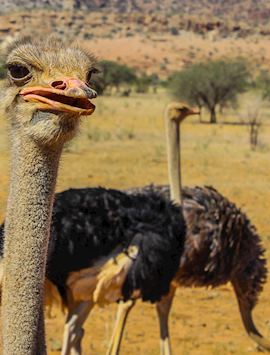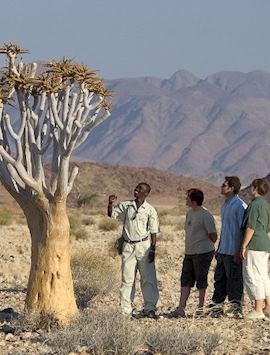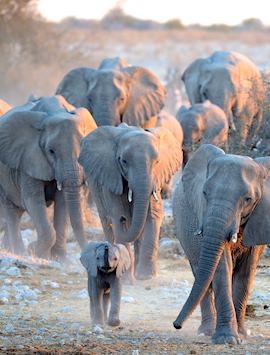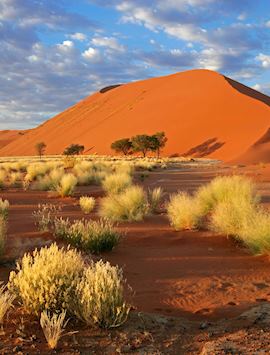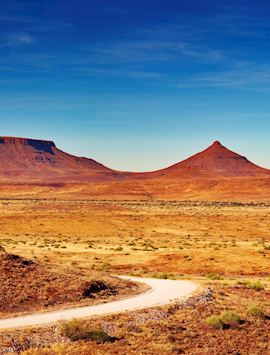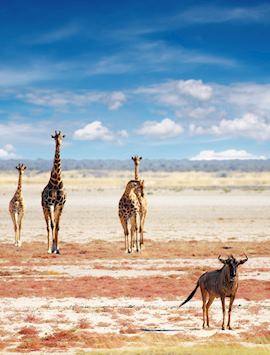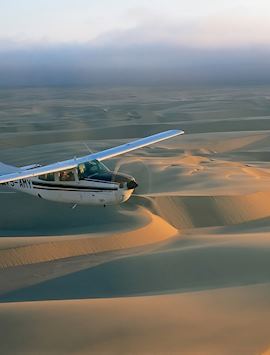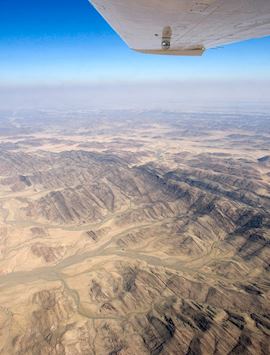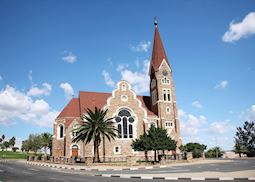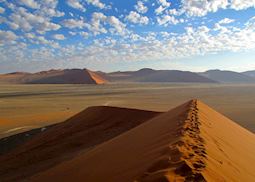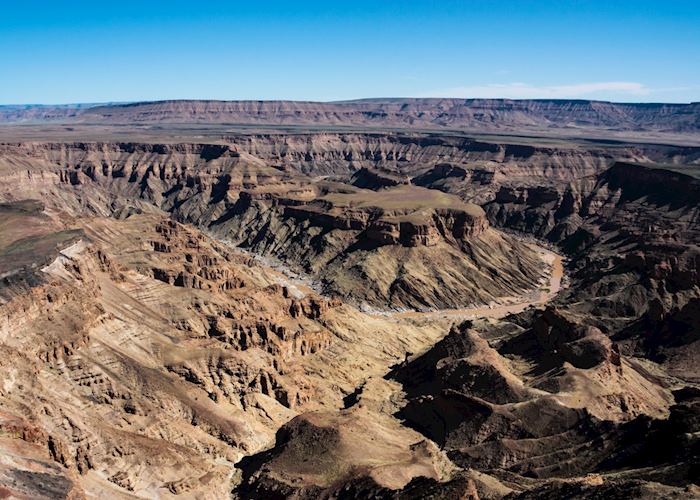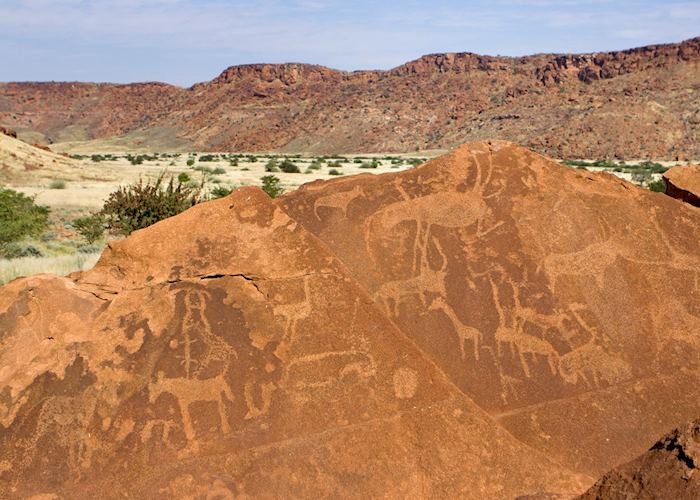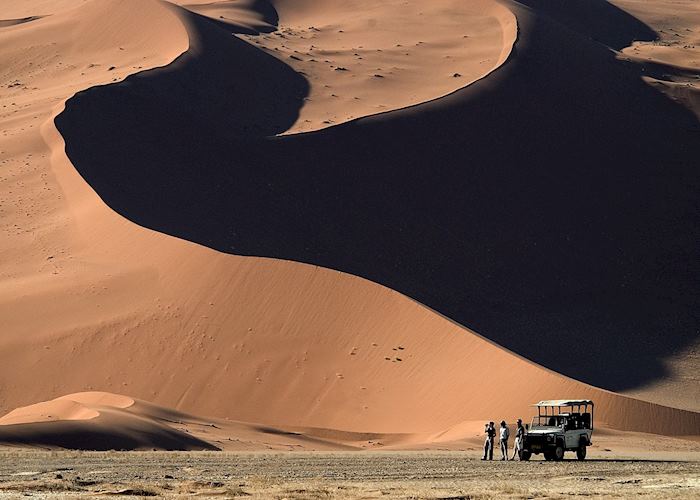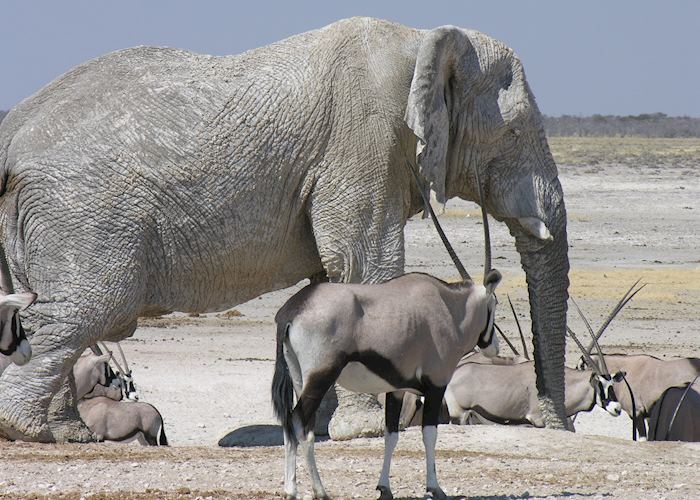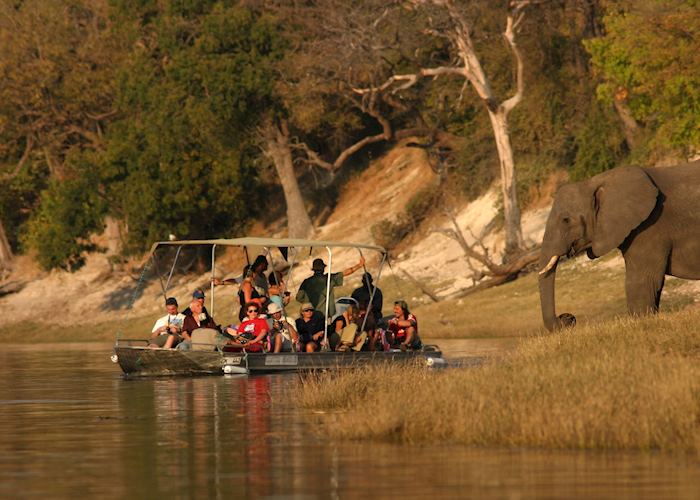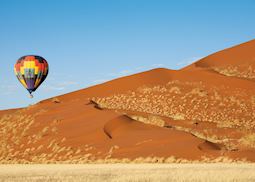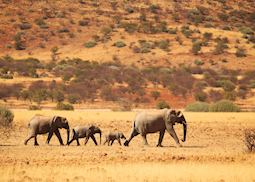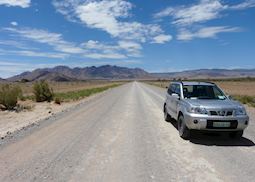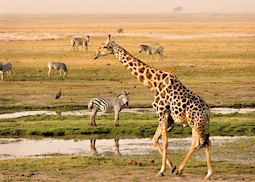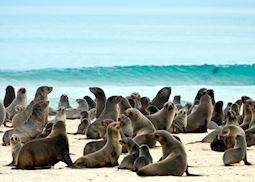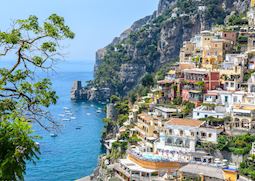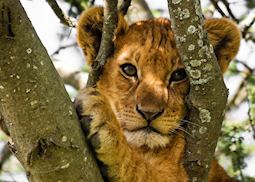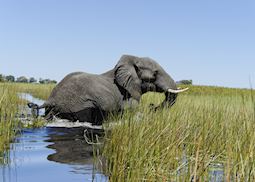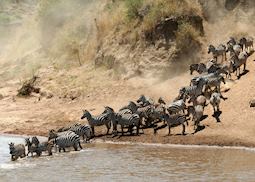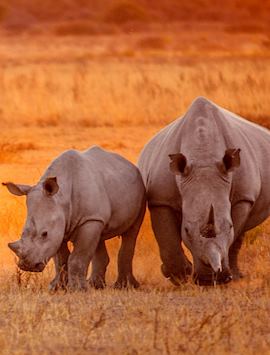
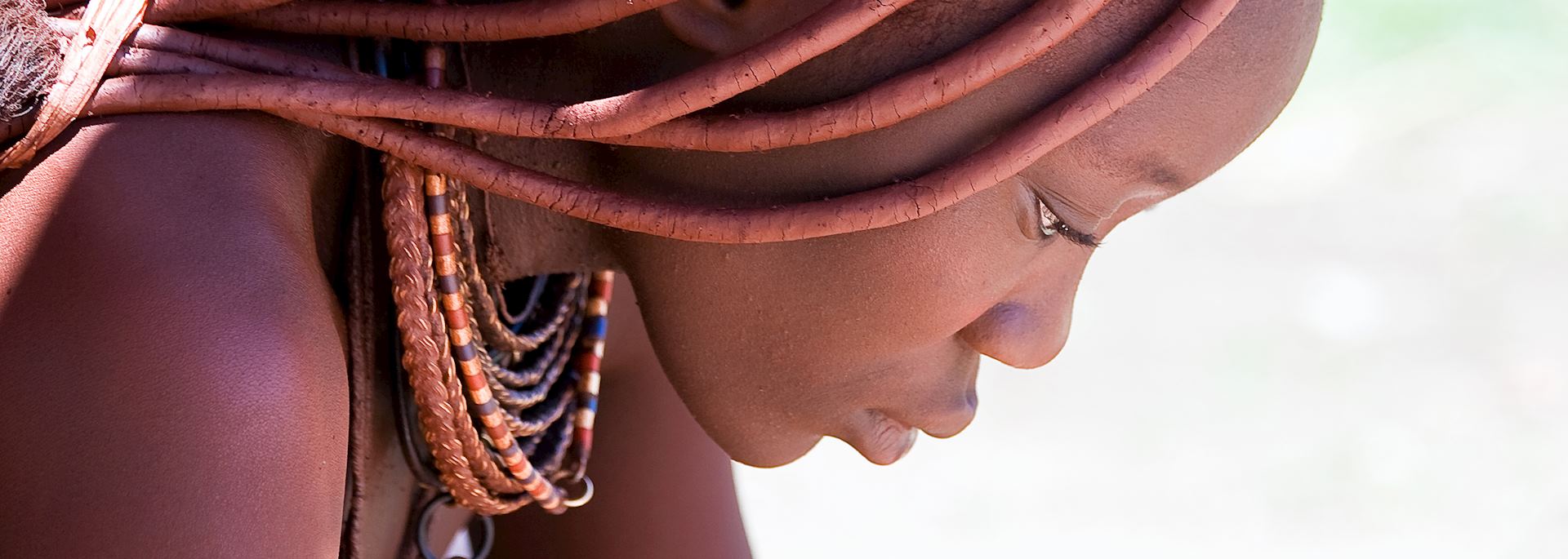
Tailor-made Namibia vacations shaped around your passions
Namibia is completely different to any other African safari destination. Much of its wildlife has adapted to its dry desert landscape, including elephant and lion. It has the world’s highest dunes, where barking geckos, cartwheeling spiders and quick-tongued chameleons scuttle across sun-baked sand. And, it has a long coastline where you can kayak with seals and see the skeletal remains of ships sent awry by thick coastal fog. Our Africa specialists have explored the country in-depth, from Sossusvlei to the Skeleton Coast, and can help you plan a vacation to Namibia tailored to your interests.
Namibia lends itself to self-driving, with well-maintained roads giving you access to Etosha National Park’s silvery salt pans, the red-rock landscape of Damaraland, and the vast crevasse of the Fish River Canyon. Photographers need look no further than Deadvlei, where burnt-orange dunes contrast against blackened camelthorn trees and clear blue skies. Meanwhile, Swakopmund offers more active experiences for families, from quad biking to sandboarding.
Suggested tours for Namibia
Using their first-hand knowledge, our specialists can create a tour of Namibia that gives you a chance to spot wildlife in Etosha National Park, take in the ancient rock art at Twyfelfontein, and visit the sand dunes at Sossusvlei. We can arrange for you to enjoy a self-drive safari, or a private escorted tour that's tailored to your travel interests.
Suggested activities for Namibia
Make the most out of your Namibia trip, we'll choose experiences that have been tried and tested by our specialists and carefully matched to your interests. That could be kayaking trip to Pelican Point for a close encounter with cape fur seals, or a guided hike, in Fish River Canyon — the world's second-largest canyon.
-
Windhoek City Tour ![Christuskirche, Windhoek]()
Windhoek City Tour
WindhoekWindhoek City Tour
Taking in the sights of the city, you can stop at viewpoints and various historical sites including the Christuskirche, Tintenpalast, and the Alte Feste museum.
View details -
Fish River Canyon Hiking ![Fish River Canyon, Namibia]()
Fish River Canyon Hiking
Fish River CanyonFish River Canyon Hiking
Fish River Canyon, often compared to America's Grand Canyon, is one of Namibia's least visited wonders with incredible scenery but often challenging trekking conditions.
View details -
Sossusvlei Dune Excursion ![Climbing the sand dunes at Sossusvlei]()
Sossusvlei Dune Excursion
Sossusvlei & SesriemSossusvlei Dune Excursion
Enjoy the amazing scenery of Sossusvlei, and maybe take a short walk to Deadvlei, a bizarre collection of ancient camelthorn trees, or climb the nearby dunes.
View details
More choice for your safari
- Inspiration across all our African destinations
- Trip suggestions based on your interests
- Advice on where to safari, when
- Meet our team of safari experts
Best time to visit
Our specialists advise on the best months to visit Namibia, including information about climate, events and festivals.
Request our brochure
Covering all seven continents, The World Your Way shows you how you can see the world with us. It features trip ideas from our specialists alongside hand-picked stays and experiences, and introduces our approach to creating meaningful travel experiences.
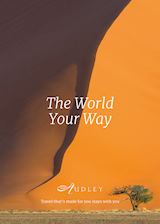
Useful information for planning your vacation in Namibia
The official language of Namibia is English, although Afrikaans and German are also widely spoken. There are many local languages, most of which fall into the Bantu and Khoisan language groups.
The currency of Namibia is the Namibian dollar (N$). It’s tied to the South African rand and both are used freely in Namibia. The Namibian dollar is a closed currency, so you won’t be able to buy it before arriving, but you’ll find ATMs in most major towns, including Swakopmund and Okaukuejo.
Larger hotels, shops, and restaurants accept credit cards, and some hotels and lodges may accept payment in US dollars as well, although the exchange rate will usually be poor. Although fuel can be paid for by contactless credit cards, we recommend that you always have some cash as a back up.
In Namibia, you should try local dishes such as pap (a stiff maize porridge served with stews), el potjiekos (stew cooked in a three-legged pot), and meat skewers which are often made with ostrich, crocodile, zebra, or antelope meat. Oodhingu (air-dried meats) are a popular snack, and you’ll find fresh seafood by the coast.
In restaurants, you’ll often find steak, chicken, and schnitzel on the menu, and camps and hotels usually serve an international menu.
You should wear conservative casual wear in Namibia, and bring warm clothes for the evenings which can be cool, especially in the desert.
Tipping is voluntary, but if you’d like to, we recommend tipping around 10% at restaurants in Namibia. You should also tip guides at the end of your stay in camp, and if you wish, add a contribution to the communal tipping box for camp/lodge staff. Porters will also appreciate a small tip. It’s also the custom in Namibia to give a small tip to car park and fuel station attendants.
For the latest travel advice for Namibia, including entry requirements, health information, and the safety and security situation, please refer to the State Department website.
Namibia is known for its enormous, sculpted sand dunes, grand, cinematic landscapes, extraordinary wildlife viewing, and off-the-beaten track experiences. Rent a car and explore independently in a country that encompasses the world’s highest dunes, a vast, gaping canyon, and remote lodges that offer luxury as well as unmatched safaris.
You can take a hot-air-balloon ride over the desert, sandboard down dunes, visit seal colonies by kayak, or see hundreds of elephant gather around a diminishing water hole. Get out on foot and hike Fish River Canyon, or ride across grassy plains on horseback. Namibia’s allure lies in its diversity, and the variety and quality of the experiences it has to offer.
In Namibia, you can stay in boutique hotels, historic guesthouses, tented camps, lodges, and farmhouses. Namibia has a great choice of places to stay and whether you’d like to bed down in a thatched chalet near the mountains, at an owner-run guest farm, or a rustic safari camp, we can help you find the right options.
You could stay in a luxurious ecolodge, join nature drives from a rural farmstead, or base yourself at a characterful wilderness lodge, and if you enjoy hiking, there’s always the option to join a multi-day trek where you camp under the stars. To get some more ideas, browse our collection of places to stay in Namibia.
In Namibia, you should visit Etosha National Park, Sossusvlei, Damaraland, and the Skeleton Coast for a good overview of the country. Most visitors arrive in the small but cosmopolitan capital Windhoek and spend a night there before moving on to the Naukluft Mountains, a scenic area for wildlife watching, and Sossusvlei to see the towering dunes.
The water holes in Etosha National Park attract huge herds of elephant and other wildlife, while wild and remote Damaraland is another great spot for wildlife watching or to see ancient rock art. For shipwrecks, canyons, and dramatic rock formations, the Skeleton Coast is an otherworldly place where the desert dunes drop into the sea.
In Namibia, you can see black rhino, desert-adapted elephant, lion, giraffe, and cheetah. Wildebeest graze on the arid grasslands. Hyena, kudu, oryx, springbok, and zebra are easily spotted, leopard laze in trees, and a huge variety of birdlife inhabits the parks and reserves. You can also spot seals along the coast.
It takes around 24 hours to fly from the East Coast of the US to Namibia; from the West Coast it takes around 27 hours.
The time zone in Namibia is UTC+2 hours. Daylight Savings Time is not observed.
The best way to get around Namibia is to drive. The roads are well maintained, traffic is light, and the scenery you pass along the way is a highlight. If you’d prefer not to drive yourself, we can arrange for a private driver to take you to your destination. Once you reach your camp, guides will take you on foot or by 4x4 to remote areas. Alternatively, you could choose to fly between camps and see Namibia from the air.
US citizens don’t need a visa for stays up to 90 days in Namibia. Nationalities of other countries should check their visa requirements.
Your doctor can provide you with immunization advice for Namibia, but you should also ensure you’re up to date with the recommended vaccinations for your home country. You can also check the recommended vaccinations by visiting the Centers for Disease Control and Prevention website.
Malaria is a risk throughout Namibia. Please see your doctor for advice about which antimalarial medication you should take.
Avoiding mosquito bites is the most effective step you can take to reduce your risk. Wear long, loose clothing, use a mosquito net in unscreened rooms, and wear a repellent, ideally with 50% DEET. Take repellent from home just in case there’s a shortage locally.
Check that your passport is valid for at least six months from the date of entry into Namibia and has a minimum of two consecutive blank pages.
Namibia in pictures
Our expert guides to traveling in Namibia
Written by our specialists from the viewpoint of their own travels, these guides will help you decide on the shape of your own trip to Namibia. Aiming to inspire and inform, we share our recommendations for how to appreciate Namibia at its best.
-
![Orlando Namibia guide]()
Orlando Haraseb - Wanderlust Silver Award winner
We were recently lucky enough to catch up with Orlando Haraseb, one of our Namibian guides and winner of the Silver Award at last year's Wanderlust Guide Awards.
-
What to do in Namibia: our highlights guide ![Sossusvlei, Namibia]()
What to do in Namibia: our highlights guide
What to do in Namibia: our highlights guide
Home to the world’s tallest sand dunes, a wild Atlantic coastline and colonial cities, Namibia is delightfully different to other African countries. Namibia specialist, Steve, details some of the key things to see and do during your time in the country.
Read this guide -
Activity vacations in Namibia ![Hot air ballooning at Sossusvlei, Namibia]()
Activity vacations in Namibia
Activity vacations in Namibia
A land of vast landscapes and wild seas there are plenty of activities for you to build into your tailor-made trip to Namibia. Quad-biking, hiking and kayaking are all popular activities, and with its exceptional wildlife, game-drives and balloon trips are equally rewarding.
Read this guide -
Honeymoons in Namibia ![Rhino in Etosha]()
Honeymoons in Namibia
Honeymoons in Namibia
Namibia often flies under the radar for honeymooners, but it’s the ideal destination for secluded desert safaris, romantic starry-night sleepouts, and a generous dose of adventure. Africa specialist Robin shares his top recommendations for honeymoons in Namibia.
Read this guide -
Luxury Namibia safaris ![Elephant, Etosha National Park]()
Luxury Namibia safaris
Luxury Namibia safaris
Flying over the Skeleton Coast, tracking rare leopard in the highlands, or sleeping under the stars at an opulent tented camp. Namibia specialist Laura outlines the best camps and experiences for a luxury safari.
Read this guide -
Self-driving in Namibia ![Self driving in Namibia]()
Self-driving in Namibia
Self-driving in Namibia
With very little traffic on well-maintained roads that wind through spectacular scenery, as well as plenty of big-game wildlife to see, Namibia is an ideal destination for a self-drive safari.
Read this guide -
Namibia safaris ![The Chobe River attracts a variety of game]()
Namibia safaris
Namibia safaris
Namibia may not immediately spring to mind when you think of a safari, but with four of the Big Five roaming Etosha National Park and the chance to see desert-adapted elephant in Damaraland, it makes a rewarding safari destination, as Africa specialist Alex explains.
Read this guide -
Family vacations in Namibia ![Seals at Pelican Point]()
Family vacations in Namibia
Family vacations in Namibia
A family vacation in Namibia can include kayaking with seals, stargazing in the desert, tracking cheetah and heading out on safari to see desert-adapted elephant. Africa specialist Iain discusses his ideas for a trip that appeals to all ages.
Read this guide
Other popular destinations
Still looking for ideas? If Namibia has captured your interest, we think you might also like these destinations.
